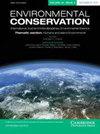被动大象再野生化的影响:对印度人类死亡的评估
IF 2.6
3区 环境科学与生态学
Q2 BIODIVERSITY CONSERVATION
引用次数: 0
摘要
亚洲的大象活动范围与人类活动区域重叠,导致频繁且往往是负面的双向互动,其中一小部分导致人类死亡。最大限度地减少这种消极的相互作用取决于获得对其模式和潜在过程的机械理解。在恰蒂斯加尔邦(印度),250-300头大象被重新放归野生,它们最近通过分散从邻近的邦扩大了活动范围,每年造成60万人死亡。使用逻辑回归模型,我们检查了与大象有关的人类死亡事件发生的八个似是而非的预测因素的影响。我们发现,70%的事件发生在大象高度密集的栖息地;其余30%分布在大象生境利用的中间和零星区域。在连接居民点的道路沿线和经常有大象闯入房屋的地区,人类死亡的概率很高,而且这种概率也受到森林斑块空间几何形状的影响。减少致命相互作用的直接实际选择包括基于社区的早期预警系统和在住区周围使用便携式屏障。明智的景观级土地利用规划旨在保持剩余完整大象栖息地的弹性,对于防止大象向次优栖息地扩散至关重要,这可能会造成复杂的冲突局势。本文章由计算机程序翻译,如有差异,请以英文原文为准。
Impacts of passive elephant rewilding: assessment of human fatalities in India
Elephant ranges in Asia overlap with human-use areas, leading to frequent and often negative two-way interactions, a fraction of which result in human fatalities. Minimizing such negative interactions rests on gaining a mechanistic understanding of their patterns and underlying processes. In Chhattisgarh (India), a rewilding population of 250–300 elephants that have recently expanded their range from neighbouring states through dispersal has been causing annual losses of >60 human lives. Using logistic regression models, we examined the influences of eight plausible predictors of the occurrence of elephant-related human fatality incidents. We found that 70% of incidents occurred in areas with high-intensity habitat use by elephants; the other 30% were in areas of intermediate and sporadic elephant habitat use. The probability of human fatalities was high along the roads connecting settlements and in areas with frequent house break-ins by elephants, and this probability was also affected by the spatial geometry of forest patches. Immediate practical options to minimize fatal interactions include community-based early-warning systems and the use of portable barriers around settlements. Judicious landscape-level land-use planning aimed at maintaining the resilience of remnant intact elephant habitats will be critical to preventing the dispersal of elephants into suboptimal habitats, which can create complex conflict situations.
求助全文
通过发布文献求助,成功后即可免费获取论文全文。
去求助
来源期刊

Environmental Conservation
环境科学-环境科学
CiteScore
5.20
自引率
3.70%
发文量
43
审稿时长
>36 weeks
期刊介绍:
Environmental Conservation is one of the longest-standing, most highly-cited of the interdisciplinary environmental science journals. It includes research papers, reports, comments, subject reviews, and book reviews addressing environmental policy, practice, and natural and social science of environmental concern at the global level, informed by rigorous local level case studies. The journal"s scope is very broad, including issues in human institutions, ecosystem change, resource utilisation, terrestrial biomes, aquatic systems, and coastal and land use management. Environmental Conservation is essential reading for all environmentalists, managers, consultants, agency workers and scientists wishing to keep abreast of current developments in environmental science.
 求助内容:
求助内容: 应助结果提醒方式:
应助结果提醒方式:


